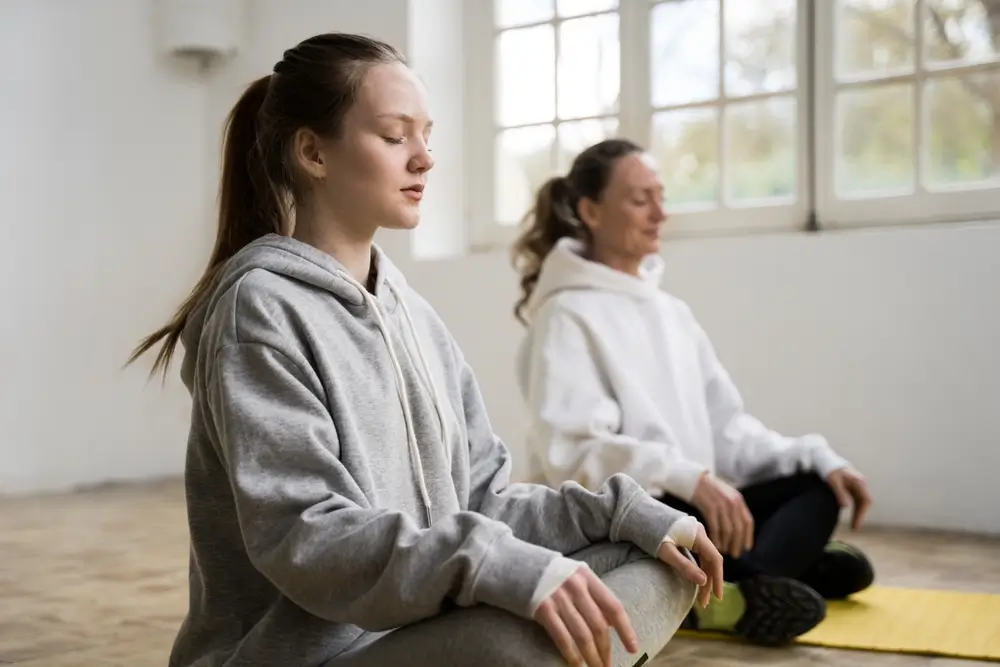The adolescent years are a challenging phase of life, with significant physical, emotional, and psychological changes. Nearly 20% of children and youth ages 3-17 in the United States have been diagnosed with mental, emotional, developmental, and suicidal behaviors which have increased by more than 40% in the decade before 2019. Providing support for teens and helping them develop healthy coping mechanisms is crucial to their mental health. Below are ten activities that teens can do to help them navigate the ups and downs of adolescence, while building resilience and emotional well-being.

Mindfulness Meditation
Mindfulness meditation is a powerful tool for teenagers to manage stress and improve their mental health. It involves paying attention to the present moment without judgment. Teens can practice mindfulness through guided meditations or simply by focusing on their breath. Regular mindfulness meditation can reduce anxiety and enhance emotional regulation, making it an excellent activity for teens to incorporate into their daily routine.
Physical Exercise
Physical activity has been proven to have numerous mental health benefits for people of all ages, including teenagers. Engaging in regular exercise releases endorphins, which are natural mood lifters. Encouraging teenagers to find a physical activity they enjoy, whether it’s playing a sport, dancing, or going for a jog can help them reduce stress and anxiety. Regular exercise also improves self-esteem and body image.
Creative Arts Therapy
Art therapy, music therapy, and other creative arts therapies provide an outlet for teens to express themselves and process their emotions. These activities can be particularly effective for teens who may struggle to communicate their feelings verbally. Creative arts therapy can boost self-esteem, alleviate symptoms of depression, and foster a sense of accomplishment and self-expression.
Journaling
Journaling is a simple yet highly effective way for teens to explore their thoughts and emotions. Encouraging teenagers to keep a daily journal where they can write about their experiences, feelings, and challenges can help them work through emotions in healthy ways. Journaling allows them to gain insight into their emotions, track patterns, and find healthy ways to cope with stressors. It can also serve as a form of self-reflection and a means to set goals for personal growth.
Peer Support Groups
Teenagers often benefit from connecting with their peers who may be experiencing similar challenges. Peer support groups provide a safe space for teens to share their feelings and experiences. These groups can be organized around specific mental health issues, such as anxiety or depression, or be more general in nature. Knowing they are not alone and gaining perspective from others can be incredibly comforting for teens.

Nature and Outdoor Activities
Spending time enjoying nature and engaging in outdoor activities can have a profound impact on a teenager’s mental well-being. Nature has a calming effect on the mind and can reduce symptoms of stress and anxiety. Encouraging teens to go for hikes, camping trips, or even just spend time in the local park can help rejuvenate minds and instills calmness. The fresh air and natural surroundings can provide a much-needed break from the pressures of daily life.
Volunteering and Community Engagement
Getting involved in community service and volunteering can be a rewarding way for teenagers to boost their self-esteem and sense of purpose. Volunteering allows teens to connect with others, make a positive impact on their community, and gain a sense of accomplishment. It can also help them develop empathy and a broader perspective on life’s challenges.
Cognitive Behavioral Therapy (CBT)
Cognitive Behavioral Therapy (CBT) is a structured therapeutic approach that helps individuals identify and change negative thought patterns and behaviors. While it’s typically administered by mental health professionals, some aspects of CBT can be incorporated into daily life for teens. Encouraging teenagers to challenge negative thoughts and replace them with more positive and realistic ones is a skill that can help them manage stress and anxiety more effectively.
Relaxation Techniques
Teaching teens relaxation techniques such as deep breathing, progressive muscle relaxation, and visualization can help them manage stress and anxiety in the moment. These techniques can be used in various situations, whether it’s before a test, a social event, or simply when they feel overwhelmed. Learning to relax their bodies and minds can be an invaluable skill that can be used in their daily lives, now and when they are in adulthood.
Healthy Sleep Habits
Adequate sleep is crucial for a teenager’s mental health. Establishing a regular sleep schedule and creating a calming bedtime routine helps to bring continuity into a teenager’s life and supports healthy mental health practices. Lack of sleep can exacerbate symptoms of anxiety and depression, so ensuring they get enough rest is essential for their overall well-being.
Launch Centers’ Approach to Teen Mental Health
Promoting good mental health in teenagers is a vital part of helping them navigate the challenges of their growing minds, bodies, and emotions. By incorporating new, healthier activities into their daily lives, they can be empowered to build resilience, develop healthy coping strategies, and maintain emotional well-being. Teens are unique and it is important to encourage them to explore different activities to find what works best for them.Launch Centers understands that mental health is often overlooked by teenagers, so it is important for them to find activities that help them prioritize it. Our experienced team works closely with the teen population to find activities and promote healthy coping strategies for stress, anxiety, and more. Call us today to explore our available resources and options for helping your teen navigate the adolescent years – building their resilience, developing healthy coping strategies, and maintaining their emotional and mental health.





